Weekly Survey Results
May 19, 2011 — A new driving tax is being considered to replace current gas tax by 2014.
May 12, 2011 — Europe to adopt stricter fishing regulations.
May 5, 2011 — Second Hacking Breach for Sony Online Service.
April 28, 2011 — U.S. has the largest fossil fuel resources in the world.
April 21, 2011 — iPads to be produced in Brazil.
April 14, 2011 — California mandates renewable portfolio standard of 33% for 2020.
April 7, 2011 — US Retail Mall Vacancies at Highest Level in over 10 years.
Q1, 2011 — Quarterly Summary 2011 Q1.
March 24, 2011 — Portugal's debt crisis enters a new phase.
March 17, 2011 — Japan struck by one of the biggest Natural Disasters in recorded history.
March 10, 2011 — U.S. and Mexico explore a new cross-border trucking agreement.
March 3, 2011 — Wisconsin protests continue.
February 24, 2011 — Unrest spreads across the Middle East.
February 17, 2011 — Asian arms race accelerates.
February 10, 2011 — Food prices hit a new historic peak.
February 3, 2011 — Egypt blocks internet to stifle protest.
January 27, 2011 — General Motors (GM) sold more vehicles in China than the U.S. in 2010.
January 20, 2011 — India's leading low-cost carrier placed order to acquire 180 Airbus jets.
January 13, 2011 — Number of bankrupt municipalities in the US expected to increase in 2011.
January 6, 2011 — Punjab Governor Salman Taseer assassinated in Islamabad on 4 January.
December 30, 2010 — Net Neutrality Endorsed by FCC.
December 23, 2010 — Google opened an online e-book store in America.
December 16, 2010 — Wikileaks releases over 250,000 confidential diplomatic communications
December 9, 2010 — China has begun severely limiting the export of rare earth metals.
Lawmakers in Washington are considering a national driving tax that would charge motorists by the mile. Improvements in fuel economy have decreased federal income from the current gas tax below the minimum level needed to build and maintain the highway network. This motivated the “Vehicle Miles Traveled Tax” program, which could replace the gas tax, or add to it, by 2014.
Normal 0 false false false EN-US X-NONE X-NONE /* Style Definitions */ table.MsoNormalTable {mso-style-name:"Table Normal"; mso-tstyle-rowband-size:0; mso-tstyle-colband-size:0; mso-style-noshow:yes; mso-style-priority:99; mso-style-parent:""; mso-padding-alt:0in 5.4pt 0in 5.4pt; mso-para-margin-top:0in; mso-para-margin-right:0in; mso-para-margin-bottom:10.0pt; mso-para-margin-left:0in; line-height:115%; mso-pagination:widow-orphan; font-size:11.0pt; font-family:"Calibri","sans-serif"; mso-ascii-font-family:Calibri; mso-ascii-theme-font:minor-latin; mso-hansi-font-family:Calibri; mso-hansi-theme-font:minor-latin; mso-bidi-font-family:"Times New Roman"; mso-bidi-theme-font:minor-bidi;}
http://money.cnn.com/2011/05/18/news/economy/gas_tax_drivers/index.htm
Summary Assessment:
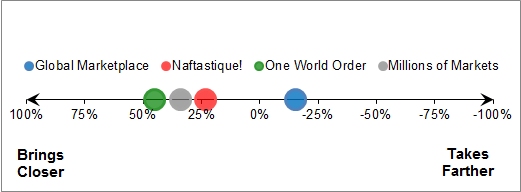
Note: This is the weighted average of the votes where "Brings Closer To" = 1, "Takes Farther Away" = -1, and "Makes No Difference" = 0.
Analysis:
The possibility of a new national driving tax coming into place was seen as taking us farther from Global Marketplace, and closer to all other scenarios. Several respondents considered this event to be counter to the open-world, pure market-driven nature of Global Marketplace. In contrast with this opinion, some participants argued that it would bring Global Marketplace closer, by “generating market activity due to construction expenditures and reducing vehicle operating costs due to better roads”, which would in turn “improve the movement of people and freight (enabling) significant increase in exports and imports”. There was no argument regarding the movement towards Naftástique! and One World Order. One participant noted that “tightening fuel consumption aims at self-sufficiency, a key component of Naftástique!”, while another reflected that “the VMT tax results in an economic incentive for gas to remain the fuel of choice, furthering Naftástique!”. The need for more restrictive regulations in order to implement the tax was seen as bringing us closer to One World Order, aided by the higher cost of travel, which would make “people inclined to travel less and concentrate in cities”. Several participants commented that the event would increase the likelihood of Millions of Markets. One respondent concluded that “high supply chain costs will favor local trade”, while another expected a “change (in) the economics, making locally and regionally produced goods more competitive”. Self-sufficiency was also mentioned as a rationale for the movement towards Millions of Markets, as well as the fact that this tax enables the government to “decouple funding generation from fuel use, encouraging alternative energies without sacrificing funding for transportation”. Nevertheless, a minority of the votes expressed the possibility of this piece of news taking us away from Millions of Markets. Some participants reflected that the tax “strengthens the federal government and keeps the focus away from local concerns”, and could damage local markets as “road improvements will foster trade at a national or international level”.
Stacked Disk Summary:
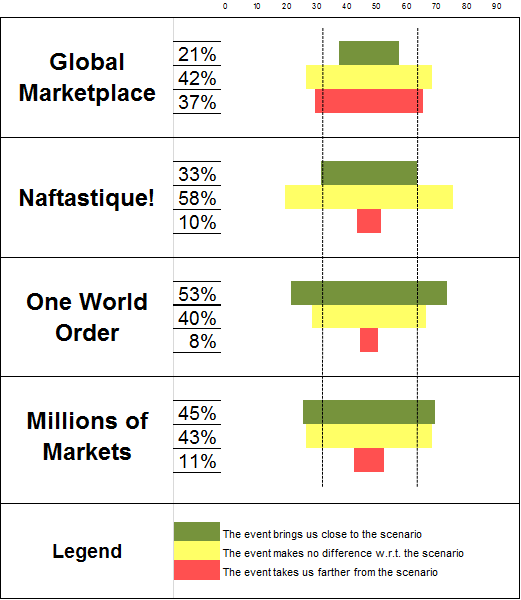
Note: These Stacked Disk figures describe the relative percentage of the responses indicating movement towards, no movement, and movement away for each scenario. The wider the disk, the higher the percentage. Top heavy figures suggest rapid movement towards a scenario, while bottom heavy ones indicate the opposite. Middle heavy figures suggest that the event in question has no predictive power for that scenario.
Rising consumption of seafood and deterioration of home fishing grounds led the Spanish fishing fleet to consume in four months its annual fishing quota from European marine habitats, and further supply for the largest European seafood market will be introduced from international waters. Spain exceeded its fishing quota for mackerel in the Bay of Biscay by 80% in 2010. The EU consequently sanctioned the Spanish fleet, whose fishermen complain that their quota will be lowered for the next five years, while the fishing capacity allotted to Norway doubles and is freed of tariffs, in exchange for investments in developing European countries. The EU is currently investigating the actions of sixteen nations, including five of its own Member States, and will introduce a stricter control of fishing in 2012, removing licenses from non-compliant fishermen.
http://www.fis.com/fis/worldnews/worldnews.asp?monthyear=&day=3&id=42438
Summary Assessment:
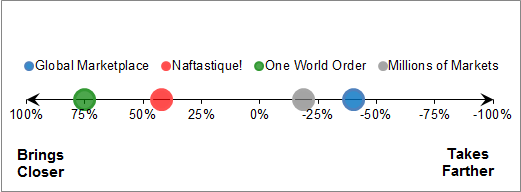
Note: This is the weighted average of the votes where "Brings Closer To" = 1, "Takes Farther Away" = -1, and "Makes No Difference" = 0.
Analysis:
This piece of news provided strong indicators of movement towards One World Order and Naftástique!, and away from Global Marketplace and Millions of Markets. This movement was explained by many respondents in terms of the approach taken at each scenario to deal with natural resources. Several participants commented that they could imagine a world where regional blocs, or an international body, would apply regulation in response to resource scarcity. One participant noted that “either Naftástique! or One World Order are more likely, it’s just a question of how broad geographically the solution will be”. In contrast, some respondents voted for a movement away from those scenarios, reflecting that “this event will make individual countries less likely to give up their sovereignty to a larger government organization”. The reduction on the likelihood of Global Marketplace and Millions of Markets was commonly explained in terms of the negative effect that regulating and rationing natural resources would have for those scenarios. The movement away from Global Marketplace was seen as likely, due to scarcity “driving protectionist and hording activities”, and “diminishing the role for the free market”. Some participants, though, commented that local quotas meant local demand would now be covered by international suppliers, which “could mean much more global trade”. The event was seen as taking us further from Millions of Markets, due to a perception of resource scarcity and a diminished role for local economies, but the largest majority of the voters indicated that this event did not affect the likelihood of that scenario. As one participant commented: “Millions of Markets relies on value added products, not on fishing.”
Stacked Disk Summary:
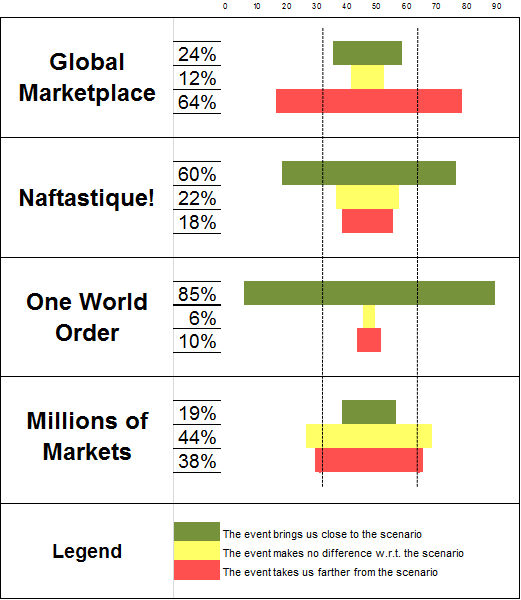
Note: These Stacked Disk figures describe the relative percentage of the responses indicating movement towards, no movement, and movement away for each scenario. The wider the disk, the higher the percentage. Top heavy figures suggest rapid movement towards a scenario, while bottom heavy ones indicate the opposite. Middle heavy figures suggest that the event in question has no predictive power for that scenario.
Sony Online Entertainment portal was closed last Monday after a second attack on the company compromised more than 100 million customer accounts. Although no fraudulent activity based on credit card information obtained from the hack has been reported, potential identity theft concerns rise due to the exposure of personal data from 24.6 million customer accounts.
http://online.wsj.com/article/SB10001424052748704436004576299491191920416.html?mod=djemalertNEWS
Summary Assessment:
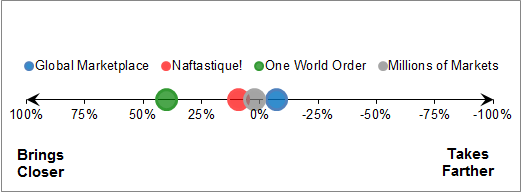
Note: This is the weighted average of the votes where "Brings Closer To" = 1, "Takes Farther Away" = -1, and "Makes No Difference" = 0.
Analysis:
This event was perceived as moving us towards One World Order, due to the possibility of increased international regulation. As one participant commented: “there could be a call for a supranational organization to deal with these types of international crimes”. The likelihood of Naftástique! was largely seen as unaffected by this piece of news, while votes were evenly distributed between all three categories concerning Global Marketplace and Millions of Markets. Some respondents viewed this piece of news as negatively affecting those scenarios, while others expected an energetic response that would indeed increase the movement towards them. Regarding Global Marketplace, an open and global trade future was seen as hurt by this event. One participant argued that it would “make for less open and transparent markets”, while another noted that “open trade, especially international trade, requires trust between the buyer and the seller”. Among the positive comments, one respondent expected an enhancement of global trade, as the event “would lead to the creation of more secure ways of doing business”. Opinions were likewise divided concerning Millions of Markets, where some voters saw a movement away from that scenario, because “the only way to limit potential damages, is to limit access”, “it will prompt more regulation of the internet and cybertrade”, and “consumers will be less inclined to see online activities as a secure alternative”. Other participants held opposite expectations, and one respondent noted that “this kind of problems always spurs technological innovation”, while another participant reflected on how those innovations would “carry the unintended consequence of allowing us to be more self-reliant”.
Stacked Disk Summary:
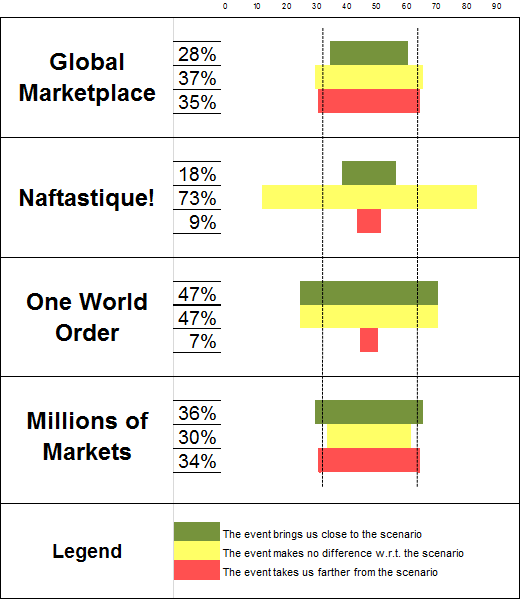
Note: These Stacked Disk figures describe the relative percentage of the responses indicating movement towards, no movement, and movement away for each scenario. The wider the disk, the higher the percentage. Top heavy figures suggest rapid movement towards a scenario, while bottom heavy ones indicate the opposite. Middle heavy figures suggest that the event in question has no predictive power for that scenario.
A report by the Congressional Research Service shows that the United States’ combined proven reserves and undiscovered resources of natural gas, oil and coal are larger than those of any other country in the world, and would dwarf those of Saudi Arabia, China and Canada combined. According to the report, the United States could meet national oil needs for 50 years, natural gas demand for 90 years, and coal needs for 218 years, without recurring to foreign sources.
Normal 0 false false false EN-US X-NONE X-NONE /* Style Definitions */ table.MsoNormalTable {mso-style-name:"Table Normal"; mso-tstyle-rowband-size:0; mso-tstyle-colband-size:0; mso-style-noshow:yes; mso-style-priority:99; mso-style-parent:""; mso-padding-alt:0in 5.4pt 0in 5.4pt; mso-para-margin-top:0in; mso-para-margin-right:0in; mso-para-margin-bottom:10.0pt; mso-para-margin-left:0in; line-height:115%; mso-pagination:widow-orphan; font-size:11.0pt; font-family:"Calibri","sans-serif"; mso-ascii-font-family:Calibri; mso-ascii-theme-font:minor-latin; mso-hansi-font-family:Calibri; mso-hansi-theme-font:minor-latin; mso-bidi-font-family:"Times New Roman"; mso-bidi-theme-font:minor-bidi;}
http://dailycaller.com/2011/03/10/new-report-says-u-s-has-largest-fossil-fuel-reserves-in-world/
Summary Assessment:
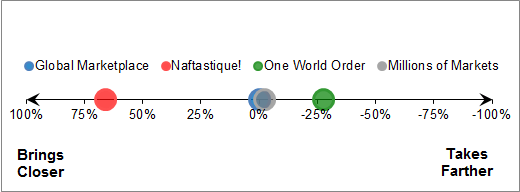
Note: This is the weighted average of the votes where "Brings Closer To" = 1, "Takes Farther Away" = -1, and "Makes No Difference" = 0.
Analysis:
This event was perceived as taking us closer to Naftástique! and farther from One World Order. The strong movement towards Naftástique! was explained because this piece of news “equaled the [playing] field in regards to fuel”, and “enhanced the feasibility of a North American trade bloc”. As one participant put it: “if we want to be energy self-sufficient, we can be.” A future resembling One World Order was seen as less likely, as that scenario “relies on the allocation of scarce resources”. According to one respondent: “if the numbers are true, future energy will be less constrained reducing the need for the ‘rationing’ approach in One World Order.” Votes were evenly distributed between all three categories in Millions of Markets and Global Marketplace, as this turned out to be a cross-road sensor for them, that is, an event in which the final outcome depends on the route taken to deal with it, or as one participant commented: “the real question is what are we going to do about it.” Some voters were optimist with regards to Millions of Markets, noting that this would enhance energy self-sufficiency and the development of technologies to economically extract those natural resources and improve our energy efficiency. Less optimistic opinions about the likelihood of Millions of Markets argued that unconstrained conventional energy resources removed the motivation for that scenario. One third of the voters thought that this piece of news took us closer to Global Marketplace, as “access to cheap energy sources helps maintain global competitiveness, and access to markets in remote locations”. But an equal amount of participants considered that the likelihood of that scenario was reduced, and a similar number voted this event as making no difference with regards to Global Marketplace, as those energy resources would not be exploited due to economic, aesthetic, and environmental reasons. In the words of one respondent: “we will continue importing resources because it is cheaper. It is all a matter of cost”.
Stacked Disk Summary:
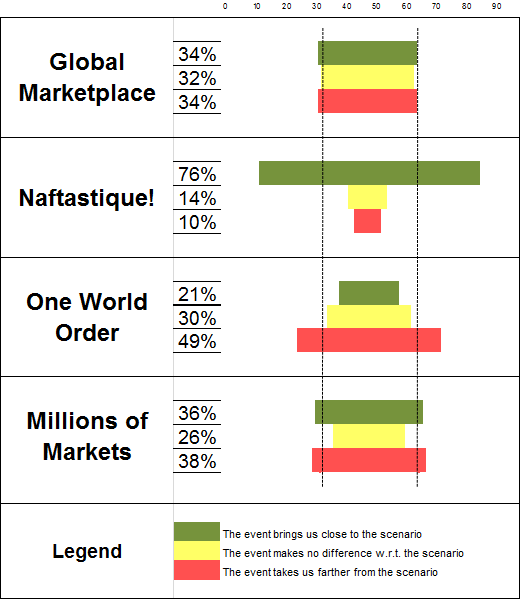
Note: These Stacked Disk figures describe the relative percentage of the responses indicating movement towards, no movement, and movement away for each scenario. The wider the disk, the higher the percentage. Top heavy figures suggest rapid movement towards a scenario, while bottom heavy ones indicate the opposite. Middle heavy figures suggest that the event in question has no predictive power for that scenario.
Aloizio Mercadante, science and technology minister of Brazil, reported that iPad manufacturer Foxconn is planning to begin building devices for Apple in South America by this November. Brazilian president Dilma Rouseff said that her government is considering Foxconn’s plan to invest $12 billion in new facilities in Brazil, a move that would help Apple break in the growing Brazilian market, where current protectionist tariffs more than double the prize of the iPad.
http://www.reuters.com/article/2011/04/12/brazil-foxconn-idUSL3E7FC2IR20110412
Summary Assessment:
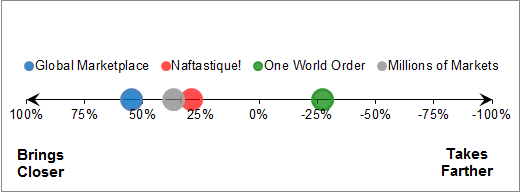
Note: This is the weighted average of the votes where "Brings Closer To" = 1, "Takes Farther Away" = -1, and "Makes No Difference" = 0.
Analysis:
This piece of news was considered to be taking us closer to Global Marketplace. “A major Chinese supplier of an American company starting production in Brazil”, in the words of one of the respondents, was viewed by most participants as a clear sign of movement towards that scenario. One comment reflected that this event could “help Brazil become more open”, while another one noted that “as crucial parts will not be produced in Brazil, global trade flows will increase”. To a lesser extent, the majority of the votes indicated an increase in the likelihood of both Millions of Markets and Naftástique!. This event was perceived as helping to set the conditions for the former scenario by 51% of the participants. A movement towards trading blocs was expected by the majority of the respondents, after the protectionist policies of Brazil had proved successful in forcing a large corporation to move production inside its borders. With respect to One World Order, the larger share of the votes considered that this piece of news was taking us farther from that scenario, as the relocation of manufacturing was motivated by market profitability, and as one participant noted “this diversification of the footprint to reach difficult customers is not environmentally friendly”.
Stacked Disk Summary:
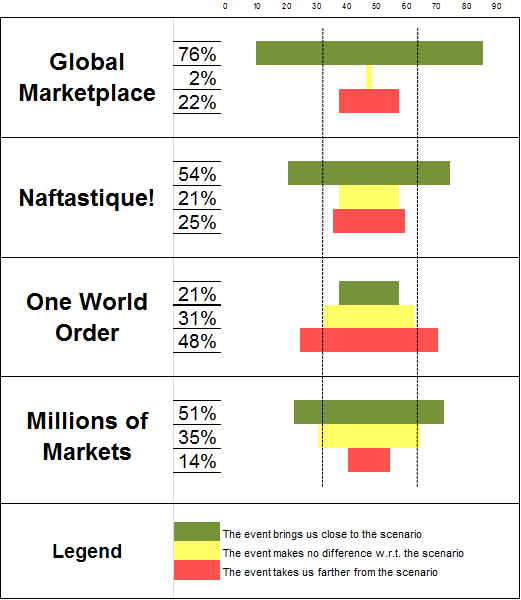
Note: These Stacked Disk figures describe the relative percentage of the responses indicating movement towards, no movement, and movement away for each scenario. The wider the disk, the higher the percentage. Top heavy figures suggest rapid movement towards a scenario, while bottom heavy ones indicate the opposite. Middle heavy figures suggest that the event in question has no predictive power for that scenario.
Gov. Jerry Brown signed Senate Bill 2 in the First Extraordinary Session (SB 2X) into law Tuesday mandating that 33% of electricity in California must come from renewable sources by 2020. Currently, only 14% of California's electricity generation is powered by renewable sources with the vast majority generated using natural gas (57%) and nuclear power supplying 15%. Renewable energy sources included in the bill include geothermal, wind, biomass, small hydroelectric plants, and solar.
Summary Assessment:
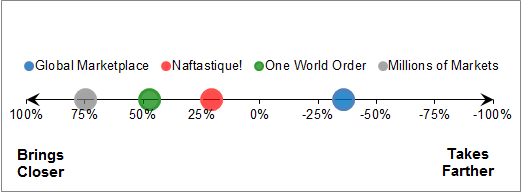
Note: This is the weighted average of the votes where "Brings Closer To" = 1, "Takes Farther Away" = -1, and "Makes No Difference" = 0.
Analysis:
This piece of news provided strong indicators of movement towards Millions of Markets and One World Order, and away from Global Marketplace. Millions of Markets was perceived as coming closer, as the event was seen as an “attempt to become more self-reliant through the use of technology”. One participant pointed out that energy independence was “a critical component to the distribution of intelligentsia regionally”, while a second one added that it “will cause conversations about local independence in food, manufacturing and other areas”. Respondents evaluated positively the likelihood of One World Order. It was noted that “this law is consistent with its goals of sustainable use”, although the movement towards that scenario would depend on “other regions adopting the same approach so it becomes a coordinated effort”, that could “push towards a supranational entity”. The event was received as being “dictated from above rather than letting the free market decide”, and therefore taking us further from Global Marketplace. One participant expressed that “the more self-reliant we are, the less incentive there is to keep global markets open”. Although the largest share of the respondents thought this event brings us closer to Naftástique!, the majority of the votes indicated that it had no positive effect on the likelihood of that scenario. As one participant concluded: “roof top solar panels create self-sufficient neighborhoods, not national trade blocs.”
Stacked Disk Summary:
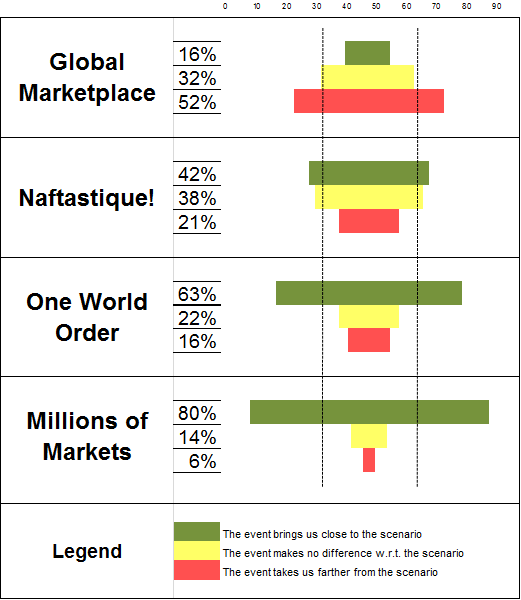
Note: These Stacked Disk figures describe the relative percentage of the responses indicating movement towards, no movement, and movement away for each scenario. The wider the disk, the higher the percentage. Top heavy figures suggest rapid movement towards a scenario, while bottom heavy ones indicate the opposite. Middle heavy figures suggest that the event in question has no predictive power for that scenario.
The bankruptcies of large retail chain stores such as Blockbuster and Borders Book Stores along with changing consumer habits have combined to create shopping center vacancy rates exceeding 11% - the highest in more than a decade. With more than one billion square feet of retail space added to the largest U.S. markets since the start of 2000, there is a glut of retail space that is not being absorbed.
Summary Assessment:
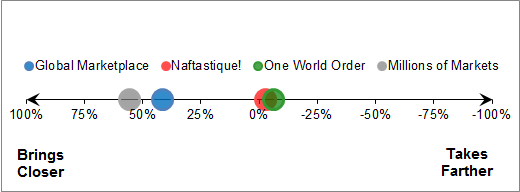
Note: This is the weighted average of the votes where "Brings Closer To" = 1, "Takes Farther Away" = -1, and "Makes No Difference" = 0.
Analysis:
This event left two strong indicators of movement towards Millions of Markets and Global Marketplace. Respondents considered Millions of Markets more likely to happen due to “shifting trends in retail distribution”, as well as in the “way consumers shop “, encouraged by “online sellers saving money and energy by avoiding brick and mortar stores”, and there being “no online interstate sales tax”. At the same time, one participant pointed out that “local populations are increasingly supporting local business”. This piece of news was perceived as moving us closer to Global Marketplace, as “the marketplace adapts to new trade conditions based on free-market”, and “we use the internet to buy at the best price possible on the worldwide market”. One respondent concluded that “at the wholesale level the global marketplace has already happened; how it gets into individual homes is a relatively small detail”. Finally the majority of the participants considered that this event did not affect the likelihood of One World Order or Naftástique!. One respondent noted that “the rise of a North American Trade Zone may be in energy, but not retail”, while another considered that “people's needs are being met by market alternatives, I do not see a power vacuum for a supranational entity to step in”.
Stacked Disk Summary:
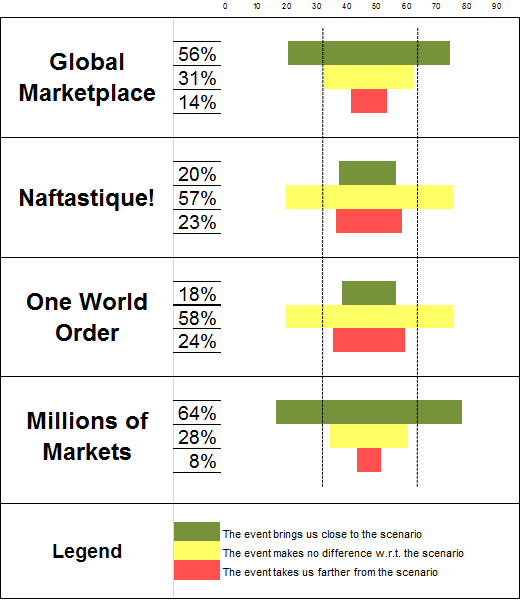
Note: These Stacked Disk figures describe the relative percentage of the responses indicating movement towards, no movement, and movement away for each scenario. The wider the disk, the higher the percentage. Top heavy figures suggest rapid movement towards a scenario, while bottom heavy ones indicate the opposite. Middle heavy figures suggest that the event in question has no predictive power for that scenario.
A lot has happened over the last three months. We have only scratched the surface of the hundreds and thousands of events and trends in our weekly Sensor in the Ground surveys. Each of us pays attention to a unique set of information sources and channels. In order to gain an overall sense of where the world may be heading, at the end of each quarter, we will send out a Sense of World survey in lieu of the weekly Sensor in the Ground survey.
Summary Assessment:
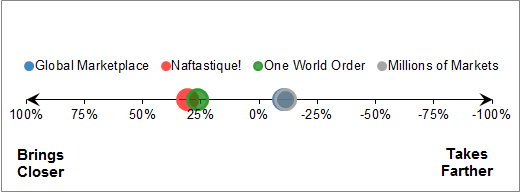
Note: This is the weighted average of the votes where "Brings Closer To" = 1, "Takes Farther Away" = -1, and "Makes No Difference" = 0.
Analysis:
The first three months of 2011 have been exceptionally active. There have been earthquakes in China, Argentina, New Zealand, and, most disastrously, coupled with a tsunami in Japan. Political protests of all levels of magnitude have raged across the Middle East as well as rust-belt cities and states. Financial pressures are impacting countries in the European Union (Ireland, Greece, and Portugal) as well as cities and states in the United States. Companies that were once leading lights in their industries have declared bankruptcy (for example, Blockbuster and Borders Bookstores) while at the same time most financial markets are surging and companies are reporting record profits and cash. Free trade agreements with the United States are slowly inching to signature with South Korea, Colombia, and Panama – while at the same time some countries are becoming more aggressive in limiting external access to their natural resources. As with most current events, the long term meaning of these events taken collectively is not totally clear.
Many of the events that we have highlighted over the last three months have turned out to be what we now refer to as “Cross Road” sensors. These are events that could indicate movement in multiple directions depending on the response to the actual event. For example, the new Net Neutrality policies could indicate a much stronger central government control of the Internet (One World Order) or if there is sufficient backlash from industry and individuals it could lead to more open standards (Millions of Markets). Similarly, the political protests and unrest in Tunisia, Lebanon, Egypt, Libya, and elsewhere could lead to open and free markets in the Middle East (Global Marketplace) or, if the protests are suppressed, to closed and more regional trading blocs (Naftastique). These and other Cross Road sensors bear continued observation.
The general consensus for the quarter, however, has been that the world has moved closer to the regional trading-bloc future of Naftastique. This implies an eventual decrease in the amount of global trade of finished goods. Beyond this, there were conflicting signals showing slight movement to Global Marketplace with an equally slight movement away from One World Order. There did not appear to be any indication of movement to Millions of Markets. The first quarter 2011 is perhaps best characterized as a season of mixed signals.
Stacked Disk Summary:
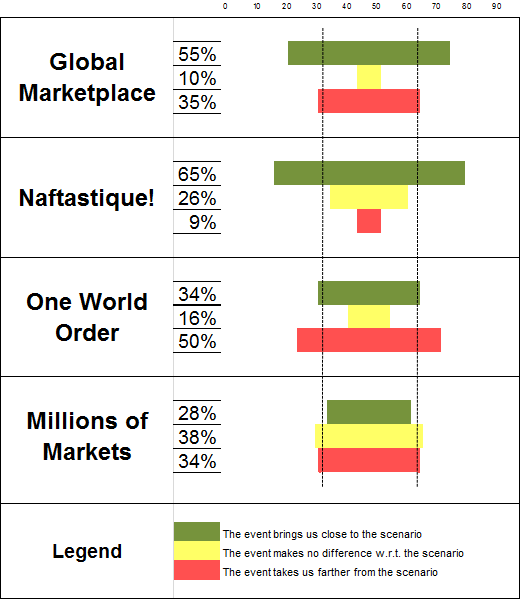
Note: These Stacked Disk figures describe the relative percentage of the responses indicating movement towards, no movement, and movement away for each scenario. The wider the disk, the higher the percentage. Top heavy figures suggest rapid movement towards a scenario, while bottom heavy ones indicate the opposite. Middle heavy figures suggest that the event in question has no predictive power for that scenario.
Event:
Portuguese Prime Minister Jose Socrates resigned on Wednesday after parliament rejected a new austerity plan to avoid being forced to ask for EU financial assistance. This new phase in the European debt crisis brings Portugal closer to needing a bailout, as Euro members Greece and Ireland did last year.
http://www.reuters.com/article/2011/03/24/us-eu-summit-idUSTRE72M8XF20110324
Summary Assessment:
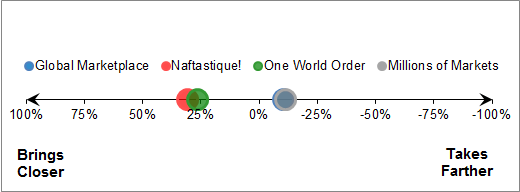
Note: This is the weighted average of the votes where "Brings Closer To" = 1, "Takes Farther Away" = -1, and "Makes No Difference" = 0.
Analysis:
The Portuguese crisis provided us with two strong indicators of movement towards Naftástique! and One World Order. The majority of the comments identified this piece of news as a crossroads event, with the potential to move us in opposite directions depending on the way in which it was finally resolved. Several participants noted that Global Marketplace would be more likely to happen “if they let them fail and don’t bail them out”, as “it is built on volatility”, and nations would “reshape themselves to survive in the new free market”. In the case that the European Union decided to help Portugal, Naftástique! was seen as coming closer, as “the bailout may come with conditions”, “Europe would be forced to work internally towards more formal policy integration”, and “consolidate its economics even further”. Many respondents considered that this crisis brings us towards One World Order, as “rather than fix its problems, Portugal bets on supranational help”, and “nations will demand stability and global economic regulation”. The opposite view was held by some participants, who commented that this event would take us farther from One World Order and Naftástique!, because this precedent would make “multinational bindings less appealing”, and nations would be “more reluctant to enter into those arrangements” to avoid “suffering from the actions of bankrupt countries”. Finally, the likelihood of Millions of Markets was considered to be unaffected by this piece of news, although one participant noted that “solvent countries will seek to be more self-reliant”.
Stacked Disk Summary:
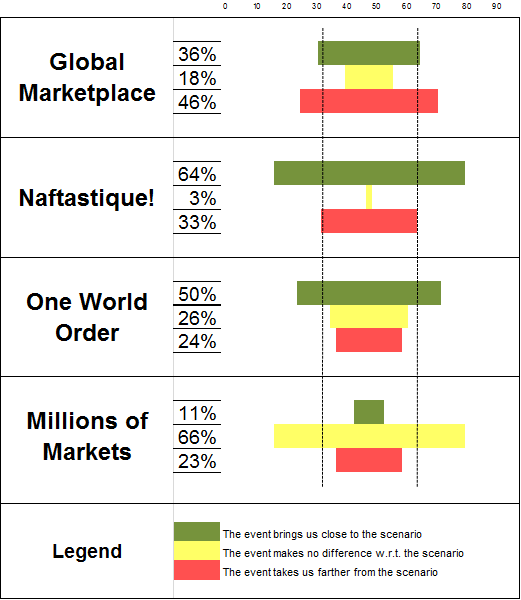
Note: These Stacked Disk figures describe the relative percentage of the responses indicating movement towards, no movement, and movement away for each scenario. The wider the disk, the higher the percentage. Top heavy figures suggest rapid movement towards a scenario, while bottom heavy ones indicate the opposite. Middle heavy figures suggest that the event in question has no predictive power for that scenario.
Event:
On March 11th Japan was hit by a 9.0-magnitude earthquake and the largest recorded Tsunami in history. Insured losses rise to $25 billion, raising the yen closer to its highest level against the dollar since World War II. Several European countries replace plans to build new nuclear plants with those to apply stress tests and switch off aging reactors. Others, like China, Indonesia, Chile and Russia might revisit safety standards but stay determined to build more nuclear power stations. President Obama confirmed that the US remains committed to nuclear power as a component of the necessary energy array to meet national energy needs, especially against increased instability in oil supplies
Summary Assessment:
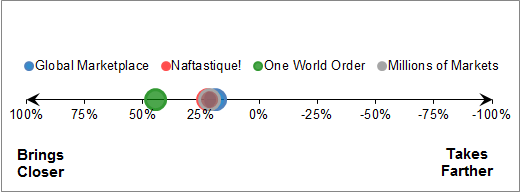
Note: This is the weighted average of the votes where "Brings Closer To" = 1, "Takes Farther Away" = -1, and "Makes No Difference" = 0.
Analysis:
The crisis in Japan left us with a strong indicator of movement towards One World Order. Most comments expected this crisis to foster future international cooperation, but differed in the anticipated outcome. In this crossroads event, global and heavily regulated responses could bring us closer to One World Order, while regional alliances might move us towards Naftástique!, international partnerships in the research of safe and efficient energy production would make Millions of Markets more likely to happen, while the futility of strict self-reliance and the importance of fast response to international crisis could move us towards Global Marketplace. The majority of the votes indicated that One World Order was more likely to happen, due to “supranational regulation on safety standards to prevent impacts on other countries”, “global regulatory frameworks to allow for nuclear energy growth” or “market solutions needing and seeking for government assistance to cope with global disasters”. Opinions were polarized in regards to Millions of Markets, most respondents expected a movement towards this scenario, as “nations will try to be self-reliant so they are not susceptible to disruptions to their supply chains”, and “new plants will mean technological advance in energy delivery”. Other participants foresaw a movement away from Millions of Markets as “Governments will shy away from riskier technologies and rely on tried, old ones”, and “skepticism may reduce the faith in un-tempered technology and being self-reliant”. Some participants viewed Naftástique! as more likely to happen, due to the “development of regional markets” as a result of bans on exports caused by “fear of radioactivity” or “exceeding carbon credits”, noting that “energy independence and hording speaks of trading blocs”. One respondent indicated that “supply disruptions will prompt business to rethink their location strategy, supply chain and strategic partnerships. I believe that some manufacturing will return” to North America, and nations will be “less dependent on the global marketplace”. Another participant considered that this event moved us closer to Global Marketplace, because the disaster “helps bring nations together to help, breaks down barriers, and reduces the sensed need of being self-reliant. This was a non-regulated response”.
Stacked Disk Summary:
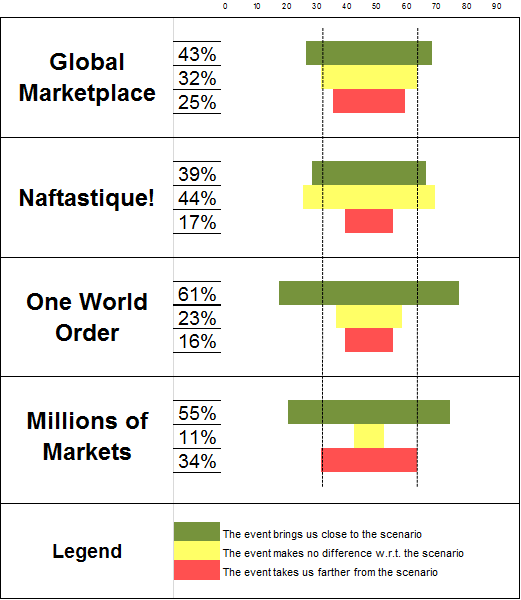
Note: These Stacked Disk figures describe the relative percentage of the responses indicating movement towards, no movement, and movement away for each scenario. The wider the disk, the higher the percentage. Top heavy figures suggest rapid movement towards a scenario, while bottom heavy ones indicate the opposite. Middle heavy figures suggest that the event in question has no predictive power for that scenario.
Event:
President Obama and Mexico’s President Calderon announced an agreement to resolve the long time cross-border trucking dispute between the U.S. and Mexico. The North American Free Trade Agreement (NAFTA) allowed Mexican trucks access to the U.S. in 1994, but intensive lobbying efforts by the unions have repeatedly prevented them from crossing the border. Mexico imposed punitive tariffs to U.S. imports in 2009. Those tariffs, currently amounting to $2.4 billion annually, will be immediately cut by half, and the rest will be lifted as soon as Mexican truckers start complying with a new set of requirements-tougher than those dictated by NAFTA or the ones currently in order for American truckers. Several U.S. unions have expressed their strong opposition to the deal, while other organizations, like the U.S. Chamber of Commerce and the American Trucking Associations, praise it. The agreement could increase U.S. exports to Mexico, border security, and trade between the two countries, bringing them closer and promoting job creation on both sides of the border. Nevertheless, it is still not a done deal, but just an open negotiation that should produce a detailed agreement proposal within the next month.
http://online.wsj.com/article/SB10001424052748703300904576178511087875924.html?mod=djemalertNEWS
Summary Assessment:
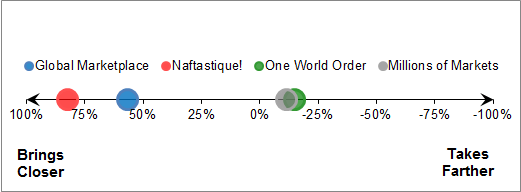
Note: This is the weighted average of the votes where "Brings Closer To" = 1, "Takes Farther Away" = -1, and "Makes No Difference" = 0.
Analysis:
The possibility of a new cross-border trucking agreement between Mexico and the US left us with two strong indicators, bringing us closer to Naftástique! and Global Marketplace. The respondents expressed their beliefs that “this action should move us closer to Naftastique!”, and would “further improve our competitive advantage as a block”, as “addressing this long time barrier only strengthens intra-continental trade linkages in North America”. It was also noted that “this could be good as a model for others to follow”. The other strong indicator was movement towards Global Marketplace. Some participants explained that “improving the cross-border flow of goods by lowering trade barriers and lowering transportation costs” improves “the capacity of both countries to compete in the global marketplace”. The majority of the respondents reflected that this piece of news made no difference with respect to Millions of Markets. Although some participants noted that this agreement would put in place enhanced regulations, most of the votes considered that it took us farther from One World Order, as the motivation and authority behind those regulations was local instead of supranational. One respondent noted that “One World Order is more likely when a higher order is needed to resolve”.
Stacked Disk Summary:
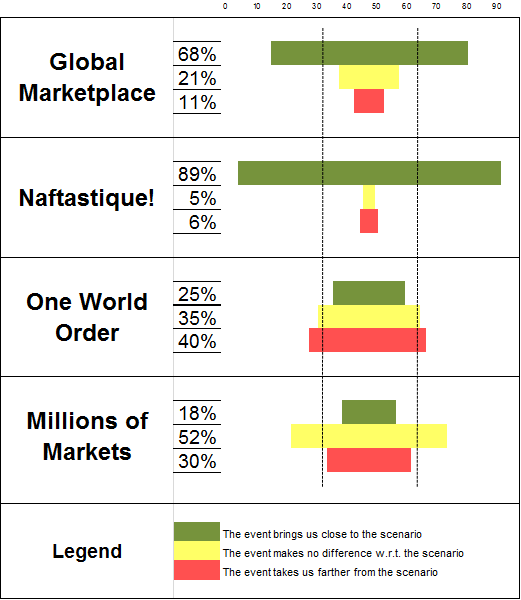
Note: These Stacked Disk figures describe the relative percentage of the responses indicating movement towards, no movement, and movement away for each scenario. The wider the disk, the higher the percentage. Top heavy figures suggest rapid movement towards a scenario, while bottom heavy ones indicate the opposite. Middle heavy figures suggest that the event in question has no predictive power for that scenario.
Event:
To address growing deficits, Wisconsin Governor Scott Walker proposed to scale back benefits for public employees. The long-term part of his budget-cutting strategy aimed at taking away collective-bargaining rights 50 years after they were first established. Bottom-up demonstrations of a scale never seen since the Vietnam War followed, and quickly spread to other states planning similar packages to remove union rights and cut employee benefits. Wisconsin protests have become a national debate, joined by politicians from all around the country.
Summary Assessment:
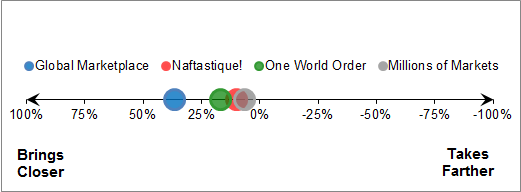
Note: This is the weighted average of the votes where "Brings Closer To" = 1, "Takes Farther Away" = -1, and "Makes No Difference" = 0.
Analysis:
The piece of news concerning Wisconsin Governor Scott Walker’s proposal to cut benefits for public employees and curbing collective bargaining rights was seen as signaling movement towards Global Marketplace, independently of the immediate result of the event itself. While one participant expressed that “Governor Walker's push is a race to the bottom movement of global marketplace”, another expressed the conviction that the protesters were “trying to uphold what most of the rest of the Western world has seen as a trade off in globalization, more worker risk means more worker safeguards - a race to the top global marketplace”. In this manner, whatever the outcome, this event was seen as “speaking to our ability to be competitive in global commerce”. The largest majority of the participants believed that this news did not have any influence with regards to the likelihood of Millions of Markets. There was no clear indicator concerning Naftastique! or One World Order, although votes indicated that the event did not take us away from those worlds.
Stacked Disk Summary:
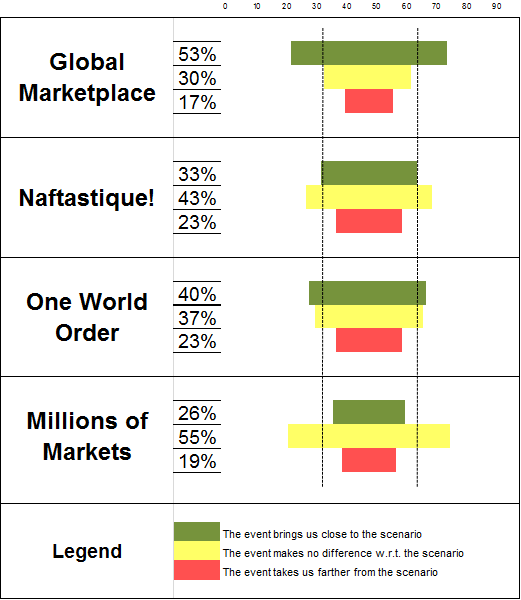
Note: These Stacked Disk figures describe the relative percentage of the responses indicating movement towards, no movement, and movement away for each scenario. The wider the disk, the higher the percentage. Top heavy figures suggest rapid movement towards a scenario, while bottom heavy ones indicate the opposite. Middle heavy figures suggest that the event in question has no predictive power for that scenario.
February 24, 2011 Survey Results
Widespread riots overthrew the Tunisian government last month, inspiring Egyptian demonstrators to force out the Mubarak regime. After protestors set fire to the parliament building in Lybia this week, Muammar Qadhafi vowed to crush the revolt and “fight to the last bullet”, while several government officers urged the army and the United Nations to support the demonstrators. The wave of uprisings, from an Arab population no longer willing to concede political rights in exchange for economic security, has spread to Morocco, Bahrain, Gaza, Iraq, Iran, Jordan, Yemen, Algeria, Syria, Kuwait and Lebanon. Arab street protests have been systematically suppressed by authoritarian regimes for the last decade, but this time Tunisian protestors showed the rest that it could be actually possible to succeed. Will this be 1989–the fall of the iron curtain–for the Middle East?
http://www.usnews.com/news/articles/2011/02/24/middle-east-unrest-spread-to-libya
Summary Assessment:
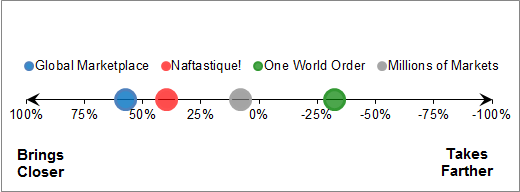
Note: This is the weighted average of the votes where "Brings Closer To" = 1, "Takes Farther Away" = -1, and "Makes No Difference" = 0.
Analysis:
The news regarding an unprecedented wave of unrest spreading through the Middle East provided us with many interesting insights. The largest majority of the participants indicated that it would take us closer to Global Marketplace, as it would ultimately encourage increased international trade. One respondent summarized this point of view observing that “if democracies emerge, they are likely to be liberal economies as well”. The other strong indicator was a movement towards Naftástique!, explained by comments noting that regional trading blocs could likely evolve “as countries attempt to minimize overall volatility”, and “to secure a guaranteed supply of scarce goods”. More than half of the votes reflected that this event is seen as taking us away from One World Order, because the regimes being threatened are “the autocrats that were the ones more likely to go along with that system”. Nevertheless, one quarter of the respondents pointed in the opposite direction, arguing that “if the rebellions turn more violent there will be more calls for the international community to intervene”, thus encouraging an increment on the functions and authority attributed to supranational regulatory organizations. This piece of news was interpreted by the greater part of the respondents as not having any effect with respect to Millions of Markets, although some participants noted that the potential increase in volatility could move us closer to that scenario, enhancing the importance of becoming “less dependent on limited and unreliable energy sources”, because “instability in the Middle East creates focus on being self-sufficient for energy”
Stacked Disk Summary:
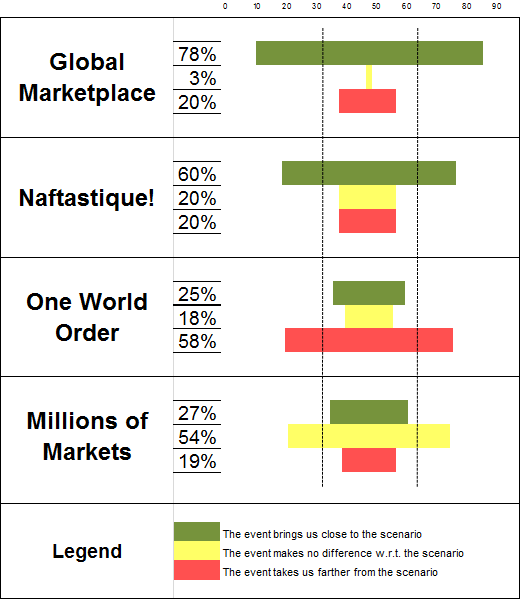
Note: These Stacked Disk figures describe the relative percentage of the responses indicating movement towards, no movement, and movement away for each scenario. The wider the disk, the higher the percentage. Top heavy figures suggest rapid movement towards a scenario, while bottom heavy ones indicate the opposite. Middle heavy figures suggest that the event in question has no predictive power for that scenario.
February 17, 2011 Survey Results
Sensor:
Is China the cause for the current Asian Arms race? Beijing's defense spending is rising faster than any other power. China is upgrading military technology while downsizing the size of the world's largest army. Many Asian countries are modernizing their armed forces, worried about China, about terrorist or separatist threats, historic rivalries, or just to raise them up to present-day standards. The Chinese government wants to enlarge their array of short and medium range missiles, create a modern navy, and invest in space warfare technology. The arms race for pre-eminence in Asia is roughest between China and India. The world’s most populous nation has secured a string of ports in Pakistan, Sri Lanka and Bangladesh, to secure energy and raw material supplies from Africa and the Middle East. The world’s largest democracy sees that as a threat to its own sea lanes, worried about tensions in the Himalayans and China’s support of Pakistan.
Summary Assessment:
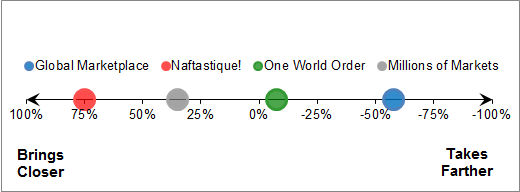
Note: This is the weighted average of the votes where "Brings Closer To" = 1, "Takes Farther Away" = -1, and "Makes No Difference" = 0.
Analysis:
The news about the accelerating Asian arms race provided two strong indicators. This event was perceived by the majority of the participants as moving us towards Naftástique! and away from Global Marketplace. Several respondents pointed out that this event could lead to the emergence of trading blocs. One participant based this on “vigorous trade for weapons potentially creating trading blocks”, while another respondent explained that “there will be trade blocks and defense agreements among nations to counter the real or perceived threat from China”. This piece of news was also seen as taking us closer to Millions of Markets. Comments such as “research in arm developments can advance breakthroughs in other fields”, reflected the possibility of space warfare threats fueling military research and ultimately providing the world with new families of inexpensive technologic enablers. There was no consensus regarding how this event relates to One World Order: albeit 48% of respondents considered the event may herald a movement away from One World, 40% indicated that the event moved us closer to it. This dichotomy was explained in the comments from several participants, who pointed out that world powers will attempt to control resource allocation, but it was not clear whether the eventual solution would be economic, diplomatic, or military.
Stacked Disk Summary:
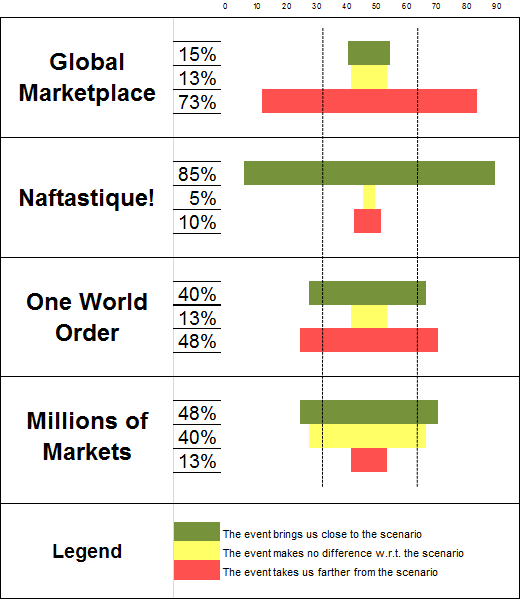
Note: These Stacked Disk figures describe the relative percentage of the responses indicating movement towards, no movement, and movement away for each scenario. The wider the disk, the higher the percentage. Top heavy figures suggest rapid movement towards a scenario, while bottom heavy ones indicate the opposite. Middle heavy figures suggest that the event in question has no predictive power for that scenario.
February 10, 2011 Survey Results
Sensor:
Global food prices hit its highest level ever in January, according to the Food and Agriculture Organization of the United Nations. The Food Price Index, a commodity basket tracking monthly changes in global food prices, increased for the seventh consecutive month. Abloreza Abbassian–FAO economist and grains expert–warned that the prices were not expected to decline in the months to come, stating that they were a major concern especially for low income households and developing countries. World food prices exceed the levels of the 2008, which led nations like India or Egypt to ban exports of cereal grains. Price and scarcity of food sparkled then riots in dozens of countries from Haiti to Cameroon. Overall food production will need to expand by 70% before 2050 to accommodate the world population growth predicted by the FAO.
Summary Assessment:
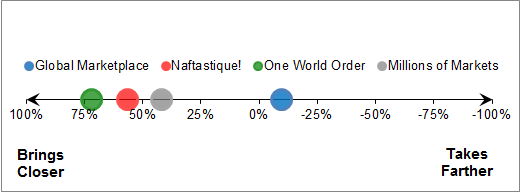
Note: This is the weighted average of the votes where "Brings Closer To" = 1, "Takes Farther Away" = -1, and "Makes No Difference" = 0.
Analysis:
Our readers considered that the historic peak in global food prices was a strong indicator of movement towards One World Order and Naftátique! It was also considered to bring us closer to Millions of Markets, and votes were split concerning its effect in the likelihood of Global Marketplace. Participants noted that this piece of news had the potential to shape our future in different ways depending on how governments chose to address the challenge: “do we hunker down and protect our resources or do we open up and feed the planet?” a respondent commented. One World Order was seen almost unanimously as coming closer, as nations would need to step in to avoid unrest due to shortages, to “keep the world from tearing itself apart over resources.” Respondents also noted that “people need to eat” and that governments would cooperate in a heavily regulated global food trade: “whatever they need to, to put food on the table.” This event was seen as taking us towards Naftástique!, because some nations could form protective blocs to ensure stable access to food for their population; as one participant put it: “countries would feed their own people first before selling any surplus.” The majority of the votes considered this event as bringing us closer to Millions of Markets, unleashing research investments to develop the necessary “technology to feed a hungry world”. Opinions were polarized regarding Global Marketplace. Pessimists argued that “free trade will not survive commodity scarcity”, while optimists expressed commented that this was “an opportunity for swift global trade to save the day”, as “higher prices will spur more food production and trade between deficit and surplus nations.”
Stacked Disk Summary:
Note: These Stacked Disk figures describe the relative percentage of the responses indicating movement towards, no movement, and movement away for each scenario. The wider the disk, the higher the percentage. Top heavy figures suggest rapid movement towards a scenario, while bottom heavy ones indicate the opposite. Middle heavy figures suggest that the event in question has no predictive power for that scenario.
February 3, 2011 Survey Results
Sensor:
On January 28, to thwart protestors from gathering momentum, the Mubarak administration took the unprecedented step of shutting down all internet traffic in and out of Egypt. During moments of social unrest, other countries like Iran had blocked access to websites like Twitter and Facebook – but no regime had ever completely severed internet connectivity. Web services across Egypt were blocked for five days, as the government attempted to dampen mass protests. Mounting pressure presumably forced the Mubarak regime to resume Internet connectivity in the country, essentially banking websites, ATMs, and social networking platforms. This five-day block hurt the national economy by at least $90 million, according to the Organization for Economic Cooperation and Development (OECD), as telecommunications and Internet services account for between 3% and 4% of Egypt's GDP. By severing those links, the government isolated domestic firms from the rest of the world. The OECD warned that Egypt could find it "much more difficult in the future to attract foreign companies and assure them that the networks will remain reliable".
Summary Assessment:
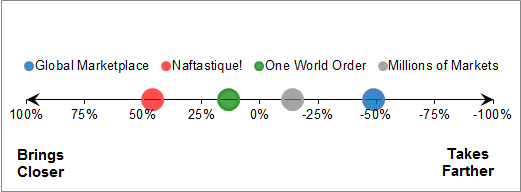
Note: This is the weighted average of the votes where "Brings Closer To" = 1, "Takes Farther Away" = -1, and "Makes No Difference" = 0.
Analysis:
The internet block in Egypt by the Mubarak regime was seen as providing two strong indicators, moving us closer to Naftástique! and farther from Global Marketplace. Votes were more evenly spread for One World Order and Millions of Markets, where the event was considered to take us slightly towards the former and away from the later. Participants expressed their concerns about Global Marketplace commenting that “it is unlikely that a free market economy will suddenly take hold in Egypt and surrounding countries”, “Global trading might be seen by a majority of Egyptians as a cause for all the unrest”, and “The threat of being shut off a major backbone (the internet) of international commerce won't look too good for most firms”. It was pointed out that this event could also make countries rely on "like-minded" nations for trade, moving us towards Naftástique!. Likewise, it was considered that political transitions in the Middle East could take us into scenarios similar to One World Order, and that this piece of news might “set a precedent for a government's desire to supersede business activity”. Regarding Millions of Markets, some participants expected private firms to consolidate ways around regulations on the use of technology, while others were not so optimist and concluded that government attempts to control of the internet moved us away from that scenario.
Stacked Disk Summary:
Note: These Stacked Disk figures describe the relative percentage of the responses indicating movement towards, no movement, and movement away for each scenario. The wider the disk, the higher the percentage. Top heavy figures suggest rapid movement towards a scenario, while bottom heavy ones indicate the opposite. Middle heavy figures suggest that the event in question has no predictive power for that scenario.
January 27, 2011 Survey Results
Sensor:
USA Today reports that in 2010, General Motors sold more cars and trucks in China (2.35 million) than it did in the U.S (2.22 million). China is now the world's not only the largest market but also the fastest growing! GM's Chinese sales were up by a stunning 28.8% over 2009, while US sales grew a modest 6.3% over the previous year.
Summary Assessment:
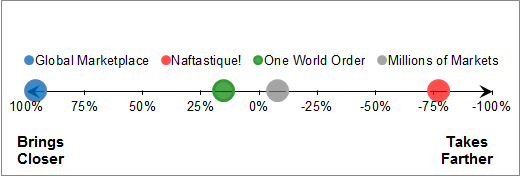
Note: This is the weighted average of the votes where "Brings Closer To" = 1, "Takes Farther Away" = -1, and "Makes No Difference" = 0.
Analysis:
The announcement that General Motors had sold more vehicles in China last year than it did in the US was unanimously seen as moving us towards Global Marketplace. Several respondents explained that the size, growth rate and increasing affluence of the Chinese market would boost international trade-“The rest of the world will rush to fill that need”. The vast majority of the votes indicated that the event takes us away from Naftastique!, being a step towards a more open and global trading system. Nevertheless, one respondent warned that we could also see an increase of protectionist measures, as some nations could choose to react by raising trade and investment barriers to capture economic opportunities. This piece of news was not seen as bringing us closer or further from Millions of Markets, as most participants considered it did not make any difference with regards to that scenario. Contrastingly, opinions were much more widespread with respect to One World Order, and although there was no clear indicator, votes indicating movement towards that scenario outnumbered the ones expressing the opposing belief.
Stacked Disk Summary:
Note: These Stacked Disk figures describe the relative percentage of the responses indicating movement towards, no movement, and movement away for each scenario. The wider the disk, the higher the percentage. Top heavy figures suggest rapid movement towards a scenario, while bottom heavy ones indicate the opposite. Middle heavy figures suggest that the event in question has no predictive power for that scenario.
January 20, 2011 Survey Results
Sensor:
Privately-owned IndiGo, India's leading low-cost carrier, placed a $15.6 billion order to acquire 180 Airbus jets, becoming the first buyer of the new A320neo, an environmentally-friendly aircraft reducing energy consumption by 15%. This fuel efficiency is expected to allow for even lower fares and increased competitiveness. In preparing to benefit from the continued growth in Indian air travel, IndiGo has become one of the largest clients of the European firm Airbus. The low-fare carrier will start international operations in August. "This will hasten the process of Indian carriers taking back some of the market share that has been lost over the past many decades to foreign carriers," said IndiGo, the ambitious new star from a promising Indian market set to explode after passenger numbers leapt by 25% in 2010.
Summary Assessment:
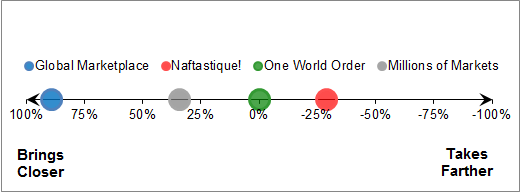
Note: This is the weighted average of the votes where "Brings Closer To" = 1, "Takes Farther Away" = -1, and "Makes No Difference" = 0.
Analysis:
The news of IndiGo's order for 180 environmentally-friendly Airbus jets was overwhelmingly seen as taking us closer to Global Marketplace; 92% of the respondents voted so. This huge cross-country trade as well as the result of the trade (more foreign travel and trade) were some of the reasons provided for this vote. This was followed by 50% of the respondents voting this news as an indication of as bringing us closer to Millions of Markets. Some of the reasons given for the trend towards Millions of Markets were the environmentally-friendly version of A320 being a sign of technological improvement and the order being indication of increased competition which would then lead to technological improvements. Not surprisingly, the huge swing towards Global Marketplace was correlated with a swing away from Naftastique - with 47% of the respondents voting so. Finally, the top vote on One World order was evenly split between "brings us closer" and "takes us away": 37% of the votes in each category. The fact that Airbus is backed by European governments and the lack of knowledge whether IndiGo is supported by the Indian government led to the vote towards One World Order.
Stacked Disk Summary:
Note: These Stacked Disk figures describe the relative percentage of the responses indicating movement towards, no movement, and movement away for each scenario. The wider the disk, the higher the percentage. Top heavy figures suggest rapid movement towards a scenario, while bottom heavy ones indicate the opposite. Middle heavy figures suggest that the event in question has no predictive power for that scenario.
January 13, 2011 Survey Results
Sensor:
Number of bankrupt municipalities in the US expected to increase in 2011. Historically, governmental financial stress at the state and local level attracted investors as the risk of bankruptcy was perceived to be low. This situation has changed dramatically over the last several years as decreasing revenue and the swelling ranks of the unemployed are pushing state and local governments to their limits. This $2.9 trillion public-debt market might not be as safe as traditionally expected. “There have been six or seven municipal bankruptcies already,” said JPMorgan's CEO Jamie Dimo. “I think unfortunately you will see more”. This domino effect of municipality bankruptcies could quickly spread to other states, such as California and Illinois.
Summary Assessment:
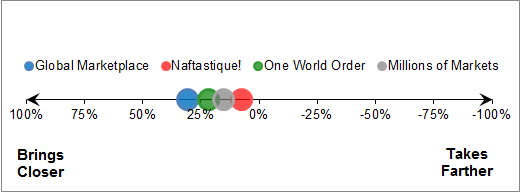
Note: This is the weighted average of the votes where "Brings Closer To" = 1, "Takes Farther Away" = -1, and "Makes No Difference" = 0.
Analysis:
The expected increase in the number of bankrupt municipalities in the US was seen by more than half of the respondents as taking us towards Global Marketplace, while the second largest majority indicated that it moves us closer to One World Order. The dichotomy was based on whether the anticipated answer to the problem was to drive more capital into the private market, or to enhance regulations upon it. One respondent thought that it depended on how the municipalities would address the issue: “A cut spending response would move us closer to Global Marketplace and a raise taxes response could move us closer to One World Order”. The news did not provide a strong indication of movement either towards or away from Millions of Markets, as noted by the majority of the responses. One respondent expanded on this noting that “When government fails we often look for technological or market based solutions to fix the problem”, cautioning that “this sort of event always happens on the tail end of recessions”. There was no consensus on how this event would effect Naftastique!, and votes were spread evenly between optimist, pessimist and indifferent options with no clear indicator.
Stacked Disk Summary:
Note: These Stacked Disk figures describe the relative percentage of the responses indicating movement towards, no movement, and movement away for each scenario. The wider the disk, the higher the percentage. Top heavy figures suggest rapid movement towards a scenario, while bottom heavy ones indicate the opposite. Middle heavy figures suggest that the event in question has no predictive power for that scenario.
January 6, 2011 Survey Results
Sensor:
Punjab Governor Salman Taseer assassinated in Islamabad on 4 January. Mr. Taseer was gunned down by one of his own bodyguards as he was leaving a restaurant. The gunman told police that he killed Mr Taseer because of the governor's opposition to Pakistan's blasphemy law. Mr Taseer, a senior member of the Pakistan People's Party, championed women's rights and supported minorities. He had made headlines recently by appealing for the pardon of a Christian woman, Asia Bibi, who had been sentenced to death for allegedly insulting the Prophet Muhammad.
Summary Assessment:
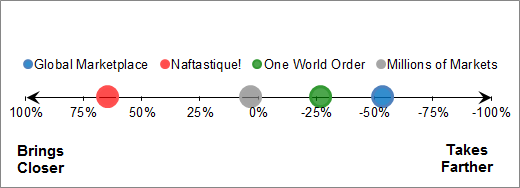
Note: This is the weighted average of the votes where "Brings Closer To" = 1, "Takes Farther Away" = -1, and "Makes No Difference" = 0.
Analysis:
The assassination in Islamabad of Punjab Governor Salman Taseer was seen to have two strong indicators: taking us towards Naftastique!, and farther from Global Marketplace. The general consensus was that this event could foster the formation of regional blocks, moving us towards Naftastique!. One respondent pointed that the risk of political unrest in some countries increases the perceived benefits of self-sufficiency, while others based the split on barriers, raised due to religious zealots or cultural preferences, limiting engagement with other countries to electronic exchanges. The likelihood of Global Marketplace, perceived as an open market for ideas as well as goods, was negatively affected by this piece of news. Almost half of the respondents believed that this event had no impact on One World Order, while the second largest majority indicated that it takes us away from that world. Most of the respondents thought that the news did not provide any indication of movement either towards or away from Millions of Markets.
Stacked Disk Summary:
Note: These Stacked Disk figures describe the relative percentage of the responses indicating movement towards, no movement, and movement away for each scenario. The wider the disk, the higher the percentage. Top heavy figures suggest rapid movement towards a scenario, while bottom heavy ones indicate the opposite. Middle heavy figures suggest that the event in question has no predictive power for that scenario.
December 30, 2010 Survey Results
Sensor:
Net Neutrality Endorsed by FCC. The FCC clears the way for the government to dictate how traffic on the Internet can be managed by providers. The proposed wording bans the selective blocking of traffic and discourages the use of any level of service pricing.
Summary Assessment:

Note: This is the weighted average of the votes where "Brings Closer To" = 1, "Takes Farther Away" = -1, and "Makes No Difference" = 0.
Analysis:
The news of the FCC approving rules governing net neutrality was seen to have three strong indicators: taking us towards One World Order and towards Millions of Markets, and taking us farther from Naftastique!. Some of the respondents commented that this event enhanced the power of governments to control markets, thus taking us farther from Global Marketplace and closer to One World Order. Other respondents expressed a contrasting opinion, for them this piece of news showed that markets would remain accessible instead of being dominated by major players, taking us closer to Global Marketplace and Millions of Markets. One respondent commented on that dichotomy, arguing that your view of the future would depend on whether you believed that precluding discriminative pricing would constrain benefits and system improvements, or on the contrary, that providers would now benefit from a larger pool of applications and revenue streams.
These diverging opinions were reflected on the votes, with almost half of the respondents being pessimistic-while the other half were optimistic-about Global Marketplace. Most participants agreed that this event moved us away from Naftastique!. The second largest majority indicated that this event did not provide any indication of movement either towards or away from that world.
Stacked Disk Summary:
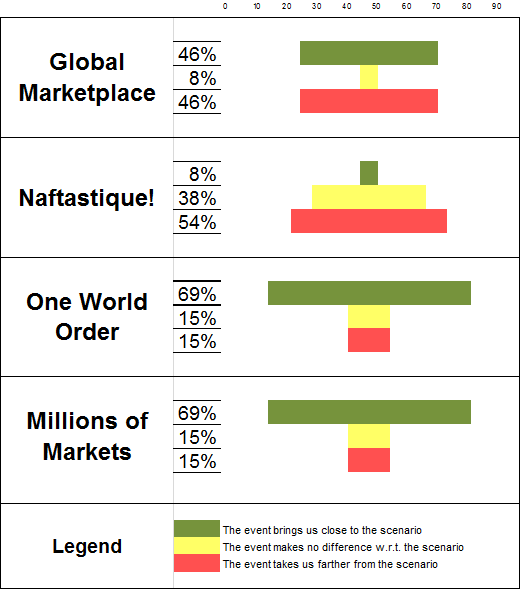
Note: These Stacked Disk figures describe the relative percentage of the responses indicating movement towards, no movement, and movement away for each scenario. The wider the disk, the higher the percentage. Top heavy figures suggest rapid movement towards a scenario, while bottom heavy ones indicate the opposite. Middle heavy figures suggest that the event in question has no predictive power for that scenario.
December 23, 2010 Survey Results
Sensor:
Google opened an online e-book store in America. Google eBooks is a potential challenger to the dominance of Amazon and Apple in digital-book market. Consumers can buy recent bestsellers and download free classic titles and read them on a number of devices, including the iPad, though not the Kindle. The service will be available in Europe and Asia next year.
Summary Assessment:

Note: This is the weighted average of the votes where "Brings Closer To" = 1, "Takes Farther Away" = -1, and "Makes No Difference" = 0.
Analysis:
The news of Google opening an online eBook store was seen to have two strong indicators: taking us towards Global Marketplace and towards Millions of Markets. One respondent commented that this event has no freight implications as it only affects the competition between electronic delivery platforms. Another respondent went beyond the immediate freight implications and pointed out the macro-level socio-economic implications, to suggest that the ease in sharing information spurs new technology development, new ideas, and fosters a broader sense of community. This rationale was reflected in most of the votes, who perceived this event to take us closer to Global Marketplace, a world with little obstacles in the flow of goods and information all over the world. The majority of the votes in Naftastique! and One World Order indicated that this event did not provide any indication of movement either towards or away from these two worlds. The second largest majority in both these worlds suggested a movement away from them.
Stacked Disk Summary:
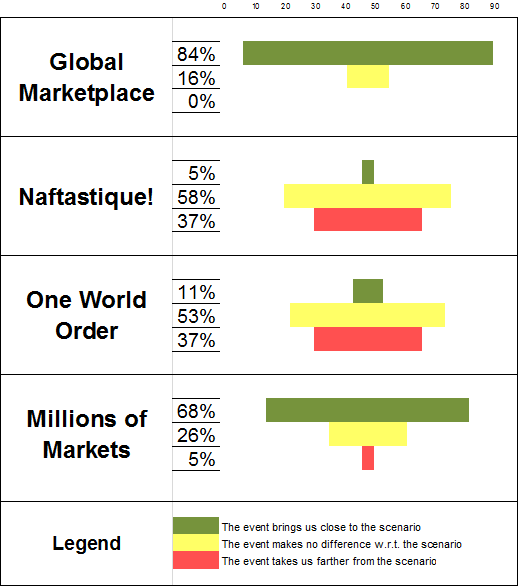
Note: These Stacked Disk figures describe the relative percentage of the responses indicating movement towards, no movement, and movement away for each scenario. The wider the disk, the higher the percentage. Top heavy figures suggest rapid movement towards a scenario, while bottom heavy ones indicate the opposite. Middle heavy figures suggest that the event in question has no predictive power for that scenario.
December 16, 2010 Survey Results
Sensor:
Wikileaks begins the release over 250,000 confidential communications and messages between the U.S. State Department and its diplomatic missions around the world. The release of these confidential documents provides an unprecedented look at bargaining by embassies, candid views of foreign leaders and assessments of threats.
Summary Assessment:

Note: This is the weighted average of the votes where "Brings Closer To" = 1, "Takes Farther Away" = -1, and "Makes No Difference" = 0.
Analysis:
One respondent noted that the entire WikiLeaks event was “a scandal all around.” Many thought that the release of these documents could lead to a loss of “global trust and respect” for the US. Others noted that there were expected to be future leaks from other countries as well so this would spread out the embarrassment. The general consensus is that this event undermines country to country cooperation – at least in the short term. The response was then divided into global trade optimists (where the leaks would lead to an open environment in the future and move us closer to Global Marketplace or One World Order) and global trade pessimists. The majority of the respondents were pessimistic. Overwhelmingly it was thought that WikiLeaks would have no impact on Millions of Markets. Conversely, there was a total lack of consensus on Naftastique!.
Stacked Disk Summary:
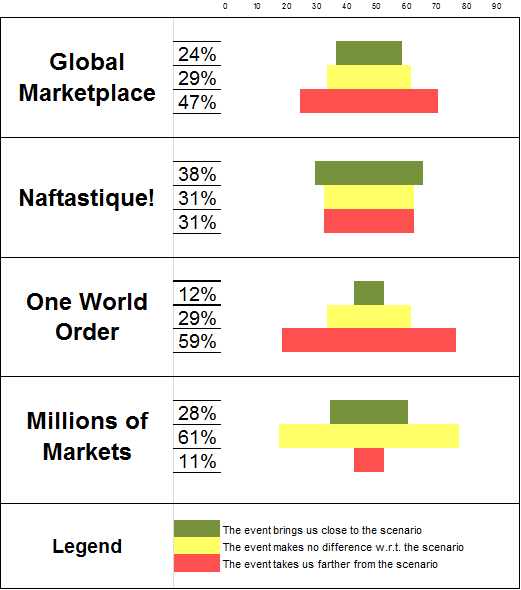
Note: These Stacked Disk figures describe the relative percentage of the responses indicating movement towards, no movement, and movement away for each scenario. The wider the disk, the higher the percentage. Top heavy figures suggest rapid movement towards a scenario, while bottom heavy ones indicate the opposite. Middle heavy figures suggest that the event in question has no predictive power for that scenario.
December 9, 2010 Survey Results
Sensor: China has begun severely limiting the export of rare earth metals.These metals are used in the manufacturing of many products to include batteries, catalytic converters, and computer display screens. China currently mines over 90 percent of the the world's rare earth minerals.Summary Assessment:
Note: This is the weighted average of the votes where "Brings Closer To" = 1, "Takes Farther Away" = -1, and "Makes No Difference" = 0.
Analysis:
The news of China’s restriction on the export of the rare earth metals was seen to have two strong indicators: taking us farther from Global Marketplace and closer to Naftastique! The comments suggested that China’s action could ratchet up trade wars, moving the world away from Global Marketplace. Majority of the respondents thought the result of this hording of rare earth metals could indicate potential formation of trading blocs - a key component of Naftastique! The effect on Millions of Markets was ambiguous. About a fifth of the respondents thought this would motivate the US to be self-reliant through technological innovations, while a third though the scarcity of rare earth would hurt the technological advancement. The largest share, however, thought it provided no indication. As to One World Order, the response was even more confusing as almost equal shares of the responses pointed in opposite directions and a quarter thought there was none at all!
Stacked Disk Summary:
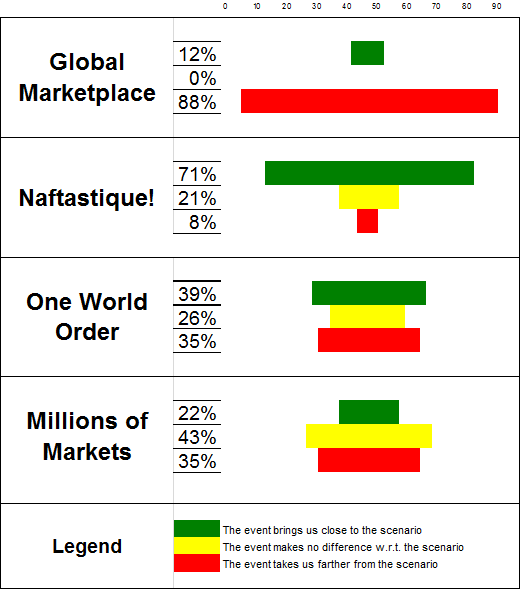
Note: These Stacked Disk figures describe the relative percentage of the responses indicating movement towards, no movement, and movement away for each scenario. The wider the disk, the higher the percentage. Top heavy figures suggest rapid movement towards a scenario, while bottom heavy ones indicate the opposite. Middle heavy figures suggest that the event in question has no predictive power for that scenario.